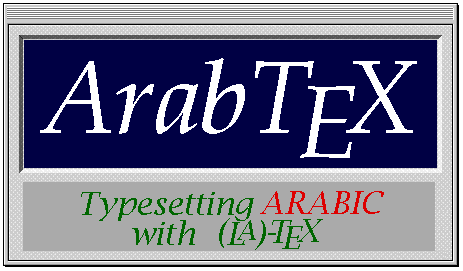

 There is a draft version of the new
user manual.
There is a draft version of the new
user manual.
Should you be an Orientalist, you might want to look at a small list of applications.
The package is available in packed form as
arabtex.zip
for PC users and
arabtex.tar.Z for *N*X users.
Depending on the server there may be also the unpacked files,
or only these.
In case of doubt, check for the latest version of
"
apatch.sty".
This file contains last minute corrections that possibly
are not yet contained in the packed files.
The following ASCII files give more detailed information:
| arabtex.faq | answers to some Frequently Asked Questions (updated as necessary) |
| changes.txt | release history, new features, and known bugs (updated as necessary) |
| changes2.txt | release history up to version 3.00 |
| install.txt | list of available files, and installation notes |
| apatch.sty | last minute corrections; put this file onto the TEXINPUT path; it will patch automatically (updated as necessary). |
 The contents of a subdirectory "REPORT", if still present, are OBSOLETE.
Refer to the (draft of the)
user manual instead.
The contents of a subdirectory "REPORT", if still present, are OBSOLETE.
Refer to the (draft of the)
user manual instead.
 ArabTeX is copyrighted by the author. If you use the system for
scientific work please give appropriate credit to the software
and the author (e.g. in the colophon of a monograph.) We also
appreciate a complimentary copy of any scientific work produced
with ArabTeX.
ArabTeX is copyrighted by the author. If you use the system for
scientific work please give appropriate credit to the software
and the author (e.g. in the colophon of a monograph.) We also
appreciate a complimentary copy of any scientific work produced
with ArabTeX.
 ArabTeX may be redistributed and/or modified under the terms
of the LaTeX Project Public License distributed
from CTAN archives in the directory
macros/latex/base/lppl.txt;
either version 1 of the License,
or (at your option) any later version.
ArabTeX may be redistributed and/or modified under the terms
of the LaTeX Project Public License distributed
from CTAN archives in the directory
macros/latex/base/lppl.txt;
either version 1 of the License,
or (at your option) any later version.
If problems turn up while running ArabTeX, please check first at "ftp.informatik.uni-stuttgart.de" whether there is a new version, or whether there are any new corrections in " apatch.sty". If the problem goes away with the new version, please inform the server you got ArabTeX from; otherwise send a bug report to the author.
Prof. Klaus Lagally
Institut fuer Formale Konzepte der Informatik
Universitaet Stuttgart
Universitaetsstrasse 20-22
D-70569 Stuttgart
GERMANY
[email protected]